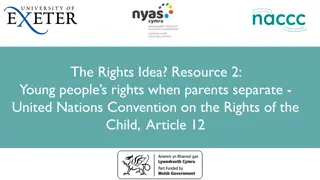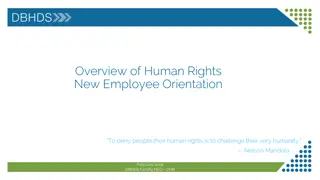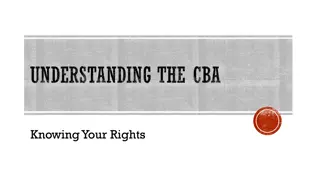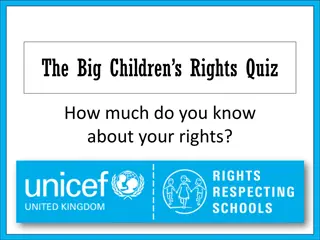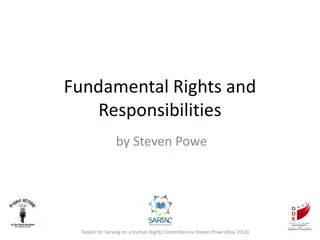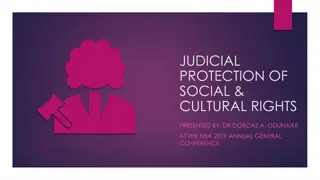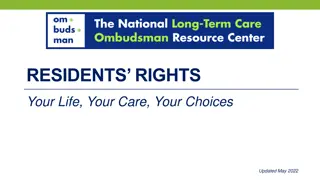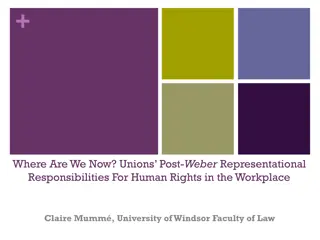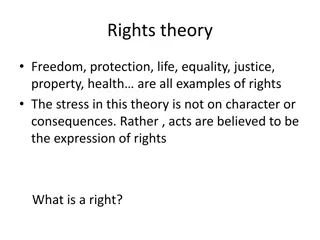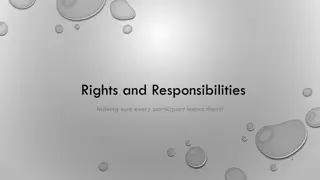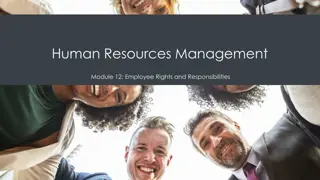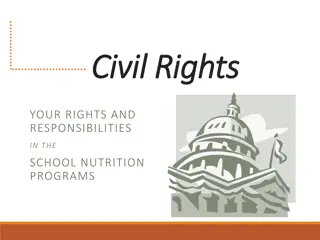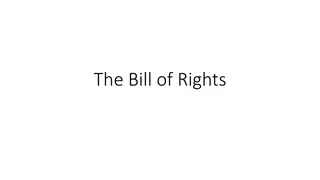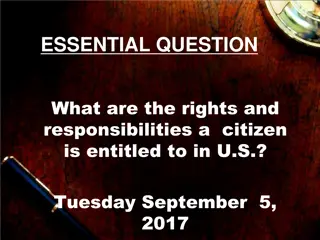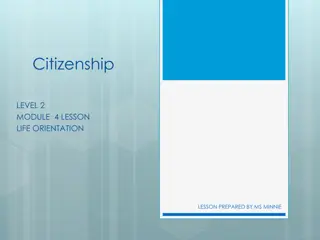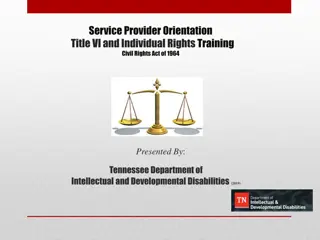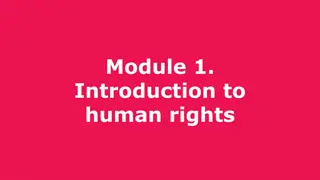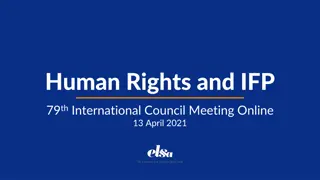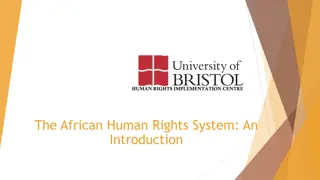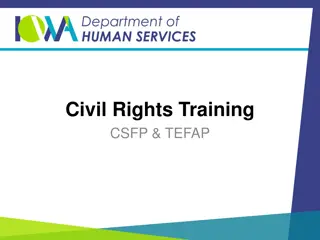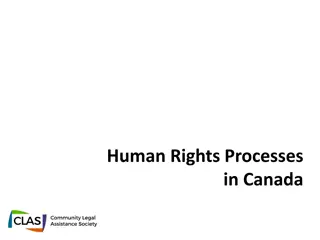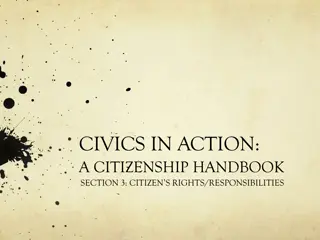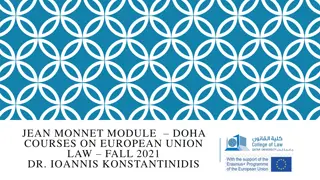Approaches to the study of Human Rights
The Marxist perspective on human rights emphasizes social rights over individual rights, viewing the full realization of self within society. Marx connects bourgeois society with human rights, highlighting how exploitation under capitalism alienates individuals. In contrast, the Third World perspect
5 views • 19 slides
Promoting Children's Rights in Education for Scotland's Learners
Raise awareness about Children's Rights, the United Nations Convention on the Rights of the Child, and how to embed them in education. Explore the importance of developing a culture that upholds rights-based practices and supports children in claiming their rights. Reflect on professional standards
1 views • 26 slides
Understanding Young People's Rights When Parents Separate
This resource provides guidance on young people's rights when parents separate, based on the United Nations Convention on the Rights of the Child, Article 12. It includes teaching slides for educators, curriculum alignment with the Curriculum for Wales, and emphasis on human rights education within
0 views • 33 slides
Understanding Human Rights in Employee Orientation
Explore the importance of human rights in a new employee orientation program at a DBHDS facility. Learn about the role of the Office of Human Rights, local and state committees, regulations, and how to protect individuals' rights. Discover the processes for complaint resolution and the significance
1 views • 61 slides
Understanding Human Rights: Overview and Evolution
Human rights encompass various aspects such as human needs, generations of rights, individual status, and the indivisibility of rights. Dr. Anna Ledzi ska-Simon discusses the translation of human needs into rights, the historical evolution of rights across generations, individual rights according to
3 views • 17 slides
Understanding Human Rights in Queensland Government Work
The Human Rights Act of 2019 in Queensland outlines protected rights such as equality, freedom of expression, and fair trial. All public service employees must adhere to these rights, ensuring decisions and actions respect human rights. This act applies to everyone in the Queensland Government, with
2 views • 13 slides
Understanding the Basic Concept of Human Rights in Modern Jurisprudence
Human rights are natural and inalienable, essential for human life, based on universal principles. The concept of human rights is both simple and complex, requiring societal development and political will for implementation. Rooted in natural law theory, human rights have evolved from natural law to
1 views • 24 slides
Understanding Your Rights and Responsibilities in the Workplace
Explore various aspects of employee rights and responsibilities outlined in the Collective Bargaining Agreement (CBA), including Weingarten rights, department procedures, peer evaluation, access to personnel and human resources files, and the importance of following procedures for effective union re
0 views • 7 slides
Test Your Knowledge: The Big Children's Rights Quiz
Test your knowledge of children's rights with "The Big Children's Rights Quiz." The quiz includes true or false questions related to the United Nations Convention on the Rights of the Child, government responsibilities, the importance of rights, and the concept of Duty Bearers. Explore these thought
0 views • 24 slides
Legal Rights and Options for Regional Center Clients in California
This document discusses the legal rights and options available for adult regional center clients in California, focusing on clarifying their rights, reviewing support systems, exploring alternatives to conservatorship, and explaining the conservatorship process. It also covers children's and adults'
1 views • 35 slides
Understanding Your Fundamental Rights and Responsibilities for Self-Advocacy
Knowing your rights is crucial to prevent others from taking advantage of you. This resource emphasizes the importance of understanding and exercising your rights, including the right to say no, live safely, have privacy, make money, communicate, be treated equally, vote, and more. It also highlight
1 views • 15 slides
Reflection on Human Rights and Criminals
Explore the complex question of whether criminals should have human rights, delving into the distinctions between absolute and non-absolute rights, and the impact of child labor on human rights. Consider the removal of certain rights from criminals and engage in critical thinking exercises regarding
1 views • 19 slides
Civil Rights Training Overview for SMP Participants
This civil rights training presentation covers the goals of civil rights, discrimination, protected classes, examples of discrimination, components of civil rights compliance, and the importance of equal access for all participants in the SMP program. It emphasizes equal treatment, knowledge of righ
0 views • 36 slides
Judicial Protection of Social and Cultural Rights in Nigeria: Insights from NBA 2019 Conference
Discussing the judicial protection of economic, social, and cultural rights in Nigeria, focusing on the challenges, international law dimensions, violations, and the role of the judiciary in upholding social and cultural rights. The presentation highlights the need for accountability and protection
0 views • 20 slides
Challenges and Progress in 1920s American Civil Rights Movement
The 1920s in America saw significant changes in civil rights, women's movement, and prohibition. Civil rights encompass personal freedoms guaranteed by the U.S. Constitution, including freedom of speech, voting rights, and protection from discrimination. Violations of civil rights have occurred thro
1 views • 42 slides
Liberal Democracy and Citizenship: Rights, Duties, and Participation
Citizenship in liberal democracies entails equal rights, duties, liberties, and constraints, with a focus on civil and political rights. The entrenchment of these rights has been key in establishing popular sovereignty and individual autonomy. Civil rights, developed in the 18th century, centered on
2 views • 16 slides
Evolution of Human Rights: From Ancient Times to Modern Era
Throughout history, ideas of rights and liberty have evolved, leading to the recognition of universal human rights in the modern sense. The concept of human rights can be traced back to significant historical events such as the English Bill of Rights, the Virginia Declaration of 1776, and the French
0 views • 7 slides
Understanding Citizenship and Immigration in Modern Democracies
Citizenship, a fundamental institution of modern democracies, defines the relationship between individuals and the state through reciprocal rights and duties. However, citizenship has a dual nature, serving to both include certain individuals as citizens and exclude others. Immigrants residing withi
0 views • 21 slides
Human Rights and Citizenship Rights in Leisure, Sport, and Tourism: A Historical Perspective
This text delves into the intersection of human rights, citizenship rights, and leisure activities like sports and tourism. It explores the definitions, history, and declarations related to human rights, emphasizing the importance of allowing individuals the freedom to pursue leisure activities with
0 views • 20 slides
Understanding Residents Rights in Nursing Homes
Residents of nursing homes have additional rights beyond their rights as U.S. citizens. These rights, protected by federal law, ensure that residents are treated with dignity, have self-determination, make choices, receive information, and have access to communication and services. Exercising these
0 views • 40 slides
Overview of International Human Rights Law and Treaties
This comprehensive overview delves into the foundations of international human rights law, exploring key documents such as the Universal Declaration of Human Rights, the International Bill of Rights, and various human rights treaties addressing discrimination, women's rights, children's rights, migr
0 views • 27 slides
Unions Post-Weber: Representational Responsibilities For Human Rights
This presentation by Claire Mumm from the University of Windsor Faculty of Law discusses the impact of expanded jurisdiction over human rights issues post-Weber on unions' representational responsibilities for their members. It delves into the changes in DFR case law, claims against unions at Human
0 views • 37 slides
Understanding Rights Theory and its Significance in Society
Rights theory emphasizes the importance of fundamental rights such as freedom, protection, life, equality, justice, property, and health. It traces back to contract theories of politics and delves into the concept of natural and conventional rights, both positive and negative. The theory posits that
0 views • 5 slides
Overview of the African Commission on Human and Peoples' Rights
The African Commission on Human and Peoples' Rights was established to promote and protect human rights across Africa. The African Charter, which entered into force in 1986, emphasizes civil and political rights, including freedom from discrimination, equality, life, personal integrity, and various
0 views • 27 slides
The Significance of Human Rights in the Modern World
Human rights are fundamental rights that belong to all individuals, are inalienable, indivisible, interconnected, and should be respected without prejudice. The Universal Declaration of Human Rights, adopted in 1948 after WWII by the United Nations, is a crucial milestone document emphasizing human
0 views • 5 slides
Participant Rights and Responsibilities Guidance
Ensure every participant understands their rights and responsibilities by providing and explaining the Rights and Responsibilities form. Offer forms in multiple languages and verbally review key points on the form to build trust. Encourage questions and discussions to clarify any confusion.
0 views • 8 slides
Understanding Employee Rights and Responsibilities in Human Resources
This module delves into the laws and regulations governing employee rights and responsibilities in the workplace. Topics covered include laws related to employee information, behavior, and social media usage. Employee rights, such as those outlined in the Fair Credit Reporting Act and the Drug-Free
0 views • 24 slides
Understanding Civil Rights in School Nutrition Programs
This content provides information on civil rights in school nutrition programs, including the rights and responsibilities of staff and participants, annual training requirements, goals to eliminate barriers, definitions of civil rights terms, how to identify discriminatory actions, protected classes
0 views • 24 slides
Enhancing Transparency in Human Rights Performance Measurement
This information focuses on initiatives like the Human Rights Measurement Initiative (HRMI) that aim to provide new data for researching and advocating human rights issues globally. The HRMI project, founded in 2015, collaborates with various stakeholders and is funded by philanthropic grants. It em
0 views • 19 slides
The Bill of Rights: Summary of Constitution Amendments
The Bill of Rights comprises the first ten amendments to the United States Constitution. These amendments guarantee various fundamental rights and protections to American citizens. Amendment I protects religious freedoms, free speech, and the right to assemble. Amendment II safeguards the right to b
0 views • 11 slides
Rights and Responsibilities of U.S. Citizens
Explore the fundamental rights and responsibilities of U.S. citizens as outlined in the Bill of Rights, focusing on key amendments such as freedom of speech, the right to bear arms, protection from quartering soldiers, and safeguards against unreasonable searches and seizures. Understand the balance
0 views • 25 slides
Understanding Citizenship Rights in South Africa
South Africa's Constitution guarantees various rights and freedoms to all citizens, ensuring equality, dignity, and protection. The Bill of Rights enshrines over 25 fundamental rights, emphasizing equality before the law and prohibiting unfair discrimination based on various grounds. The Constitutio
0 views • 49 slides
Understanding Human and Civil Rights in DIDD Services
Protecting the rights of individuals receiving Department of Intellectual and Developmental Disabilities (DIDD) services is essential. This training covers Title VI and individual rights under the Civil Rights Act of 1964, emphasizing equality and access to programs regardless of race, color, sex, d
1 views • 31 slides
Understanding Human Rights: Module 1 Overview
This module serves as an introduction to human rights principles, instruments, and monitoring mechanisms. It covers the definition of human rights, the Universal Declaration on Human Rights, key principles, and state obligations. Human rights are universal legal guarantees that protect individuals a
0 views • 21 slides
International Focus Programme: Human Rights and Technology Advocacy
The International Focus Programme (IFP) is actively engaging in advocating human rights and technology through various initiatives and campaigns. This includes organizing online meetings, webinars, surveys, and events to raise awareness about freedom of expression online, artificial intelligence, an
0 views • 8 slides
Overview of the African Human Rights System
The African Human Rights System encompasses various key elements such as the Organisation of African Unity, African Charter on Human and Peoples' Rights, African Court on Human and Peoples' Rights, African Union, and additional human rights-related treaties and protocols. This system aims to protect
0 views • 19 slides
Civil Rights Training for Food Distribution Programs
Civil rights training is essential for organizations receiving federal financial assistance, such as those distributing USDA foods through programs like CSFP and TEFAP. This training ensures compliance with federal civil rights laws and promotes equal treatment, dignity, and respect for all program
0 views • 29 slides
Human Rights Processes in Canada: Legislation and Protections Explained
Understand the human rights processes in Canada, including the two general sources of human rights, human rights legislation, federal vs. provincial/territorial laws, and the specifics of the BC Human Rights Code. Learn about direct and indirect discrimination, duty to accommodate, and the areas pro
0 views • 12 slides
American Citizenship Handbook: Rights, Duties, and Responsibilities
Understand the key aspects of American citizenship including rights, responsibilities, and duties. Learn about the categories of American rights, due process of law, and important terms such as citizens and naturalization. Discover the obligations of Americans such as obeying laws, paying taxes, def
0 views • 7 slides
EU Charter of Fundamental Rights and European Convention on Human Rights Overview
The course module on European Union Law in Doha focuses on the EU Charter of Fundamental Rights and its relationship with the European Convention on Human Rights. It covers topics such as the EU's accession to the Convention, external action on human rights, and the differences between the Charter a
0 views • 26 slides


